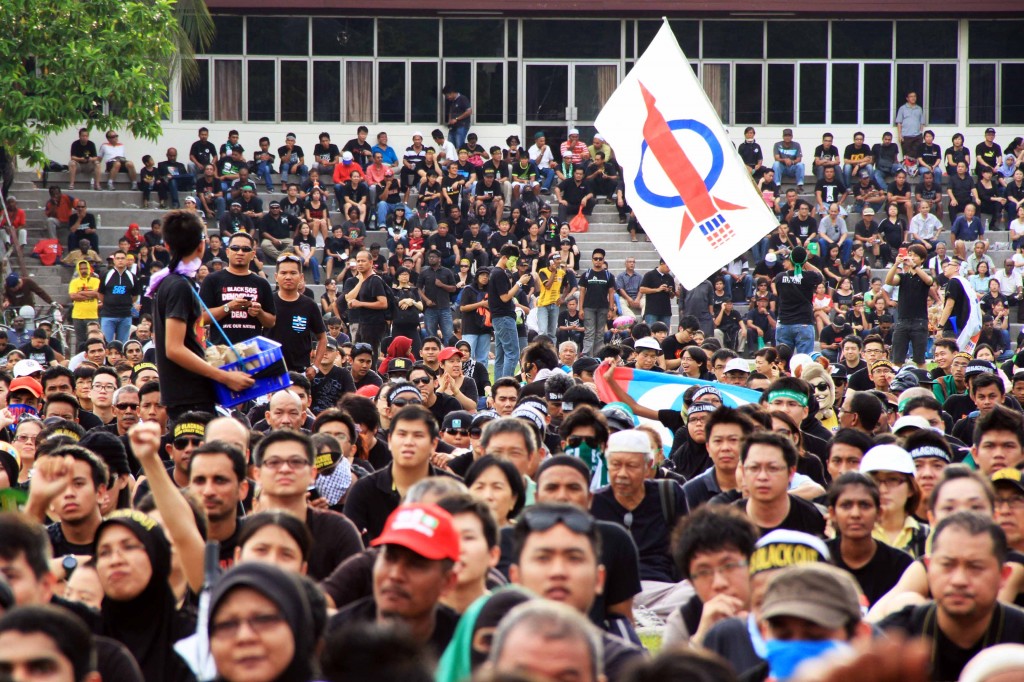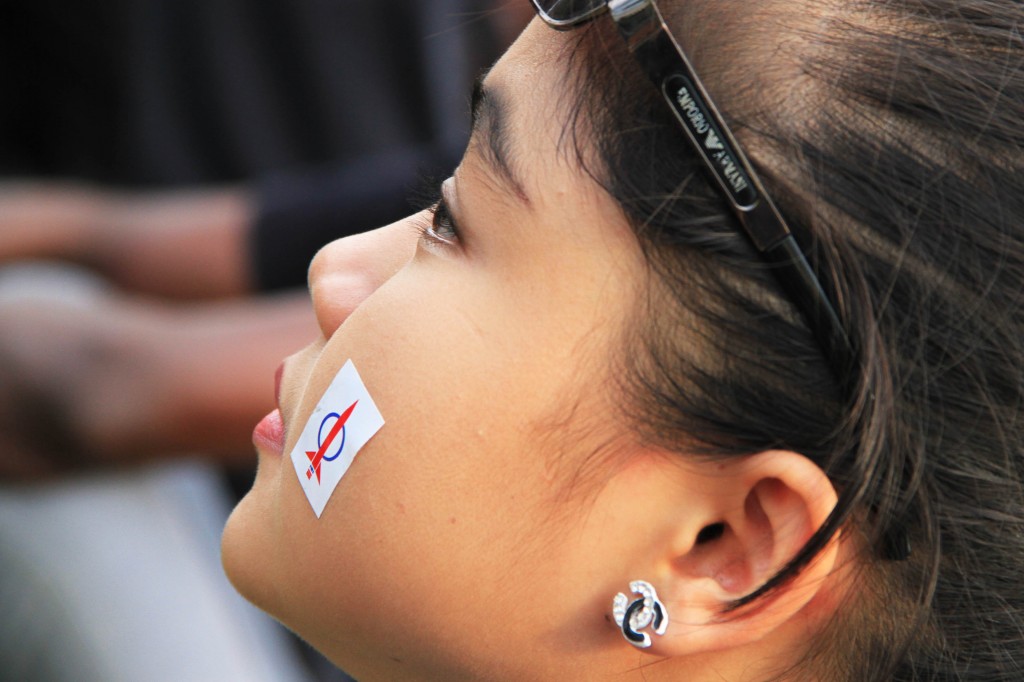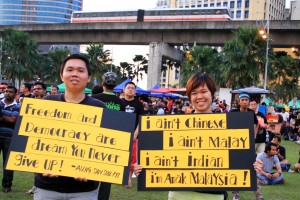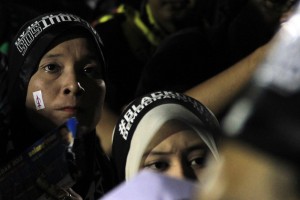 Embracing Change To Win The Future: Challenges and Development of Pakatan Rakyat As A Government-in Waiting In Accordance With The Will Of The Majority 51% Of Malaysians To Rule Putrajaya
Embracing Change To Win The Future: Challenges and Development of Pakatan Rakyat As A Government-in Waiting In Accordance With The Will Of The Majority 51% Of Malaysians To Rule Putrajaya
Salutations: Moderator Professor Danny Quah,
1. First of all, I would like to say thank you to all the students present here today who are preparing for their exams. I have been informed that this week is the start of your exams here at LSE and I am sure that all of you, being higher achievers, are already well prepared which is why you are here attending my talk this evening. Nonetheless, I would like to wish you all the best and good luck for your exams.
2. I stand here today as a proud Malaysian. I am proud of the 11.2 million Malaysians who stood in the hot sun for many hours waiting to exercise their democratic right. I am proud of the old, the young, the not so young or old, West Malaysians and East Malaysians, Malay, Chinese, Indian, Orang Asli, Eurasian, Melanau, Iban, Bidayuh, Orang Ulu, Kadazan, Murut, Bajau and everyone else who turned out to vote. 84.5% of Malaysians cast their vote on the 5th of May, a record in Malaysian electoral history. 86.8% of voters in Penang cast their vote, also a record.
3. I am proud of the hundreds of Malaysians who lined up for hours at the Malaysian High Commission here in London and who cast an overseas vote for the first time. Even though the High Commission and the Electoral Commission didn’t seem prepared, I am deeply encouraged by the fact that so many of you signed up to be overseas voters and some, to be overseas observers for Pakatan Rakyat.
4. I am also proud of Pakatan’s achievement in the 13th General Elections. Despite the overwhelming advantage of money, machinery and media enjoyed by the BN, Pakatan still won an additional 7 parliament seats, from 82 in 2008 to 89 in 2013.While the national focus has been on the parliamentary level, we must not forget that Pakatan won an additional 32 state seats. In fact, every single Pakatan party won more state seats in 2013 compared to 2008 (PAS, PKR and DAP won 2, 8 and 22 more seats respectively).
5. I am thankful to the voters in Penang who increased their support for the Pakatan state government from 58% in 2008 to 67% in 2013 and allowed us to increase the number of state seats won from 29 to 30.
6. While we did not reach our objective of forming the next government, we have made significant inroads into BN territory. By winning 5 parliament and 18 state seats in Johor, 6 parliament seats in Sarawak in addition to the 15 state seats won in the 2011 state elections and the 3 parliament and 11 state seats in Sabah, there are no longer any more ‘fixed deposit’ states for the BN.
7. For the first time in history in Malaysia, BN failed to win a majority of the popular vote and for the first time in history in Malaysia, an opposition coalition, Pakatan Rakyat, won a majority of the popular vote. By winning 51% of the popular vote, Pakatan can rightly claim to have the support of a majority of Malaysian voters. By the same token, the BN government is effectively a minority government even though it still commands a majority of seats.
8. It is also the first time in electoral history anywhere in the world, where a coalition which has so obviously won a majority of the popular vote has failed to win a majority of seats. In any other first past the post system which respects the one-man-one-vote principal, Pakatan would have won more than 51% of seats thereby allowing us to form the federal government. Instead, the stark unfairness of the electoral system is demonstrated by the fact that Pakatan won 22 out of the 28 parliament seats with more than 90,000 voters while BN won ALL 30 seats with 30,000 voters or less.
9. ‘May you live in interesting times’ is a well-known proverb. Some have said that this is a curse. If this is indeed a curse, then may it be a curse to those who want to continue to use the politics of the past, the politics of fear and intimidation in order to maintain power. These are indeed interesting times for Malaysia and Malaysians. And for Pakatan Rakyat, I foresee there to be 8 main challenges as we move towards our objective of winning power in Putrajaya.
Eight challenges for Pakatan moving forward
 10. Firstly, we have to keep on fighting the perception and false claim that the GE2013 result was a Chinese Tsunami when in actual fact it was a Malaysian tsunami. The results are very clear. The Chinese are only 30% of the total voting population. Even if Pakatan had won 80% of the Chinese vote, this means that only 24% out of the 51% of our popular vote came from the Chinese. The other 27%, or the majority of Pakatan’s support, comes from non-Chinese voters. In addition, Pakatan won more votes and seats in the Malay majority states of Perlis, Terengganu and Pahang. PAS won an additional 7 state seats in Selangor, all of which are in Malay majority areas. In Sabah and Sarawak, BN’s share of the popular vote fell by 6.6% and 5.3% respectively.
10. Firstly, we have to keep on fighting the perception and false claim that the GE2013 result was a Chinese Tsunami when in actual fact it was a Malaysian tsunami. The results are very clear. The Chinese are only 30% of the total voting population. Even if Pakatan had won 80% of the Chinese vote, this means that only 24% out of the 51% of our popular vote came from the Chinese. The other 27%, or the majority of Pakatan’s support, comes from non-Chinese voters. In addition, Pakatan won more votes and seats in the Malay majority states of Perlis, Terengganu and Pahang. PAS won an additional 7 state seats in Selangor, all of which are in Malay majority areas. In Sabah and Sarawak, BN’s share of the popular vote fell by 6.6% and 5.3% respectively.
11. The facts are very clear. I am confident that further analysis of the results will show that while the Chinese support for Pakatan did increase, it cannot be denied that many other communities also increased their support for Pakatan compared to 2008.
12. Secondly, we have to continue to fight for electoral reform through all available channels. This includes filing election petitions in seats which we lost narrowly and where we have strong proof of electoral irregularities including massive vote buying, Form 14 not being given to counting agents, reports of ‘foreigners’ voting and so on. This includes using our enhanced voice in parliament to push for wholesale changes in the Election Commission. This includes forcing the BN to cooperate with us to ensure that the upcoming re-delineation exercise is one that respects the ‘one-man, one-vote, one-value’ principle. This includes holding public forums and rallies to maintain or even increase support for electoral reform.
13. Thirdly, we have to continue to remain united in the midst of internal and external challenges. No doubt the BN will try to ‘buy-off’ some of our MPs and ADUNs in order to weaken us but this time, with better candidate selection and greater internal discipline and resolve, we believe that this is not likely to happen. There will also be pressure from within some coalition parties to deviate from the path of Middle Malaysia. But with a committed Pakatan Rakyat national leadership holding firm to our principles, as published in our Manifesto, we will remain united. The fact that the DAP was willing to use the PAS logo in Peninsular Malaysia and the PKR logo in Sabah and Sarawak is great testimony of the trust and cooperation between the three coalition partners.
14. Fourthly, we must convince more voters that the time for the politics of fear, division and intimidation are over and that we must move forward embracing the politics of hope. The Malaysian electorate, especially in the urban areas, have shown that they will not succumb to the fear mongering tactics of MCA and UMNO. One spent millions on advertisement saying that a vote for DAP is a vote for PAS and a vote for an Islamic state. The other used its propaganda machine including TV3 and Utusan Malaysia to say that a vote for DAP is a vote to dismantle Malay rights. Both tactics failed miserably in the urban areas. Our challenge is to make sure that Pakatan’s politics of hope is brought into the rural areas, especially in places where Pakatan has yet to establish its presence on the ground. DAP is already doing this in Sarawak, using our urban bases in Kuching, Sibu, Miri and Bintulu to go into new territory in the Dayak areas in the interior.
 15. Fifthly, we need to capture the hearts and minds of the younger generation so that they can be our agents for change in the next general election. Already, we have seen an unprecedented level of interest in the politics of the country among younger voters. The lines for the youngest polling streams or ‘salurans’ were the longest, a clear demonstration that the young and newly registered voters are very interested in the political process. We need to leverage on thesavvy of our younger MPs and ADUNs, especially those who are strong users of social media, to galvanize the youth vote. Many of them were disappointed after the results were announced. It is of paramount importance that we do not let them lose hope but instead incorporate them into the movement for change in this country, whether it is through political parties or NGOs. This means that we must remain ahead of the curve and ahead of the BN in using social media to engage with and win the hearts and minds of these younger voters.
15. Fifthly, we need to capture the hearts and minds of the younger generation so that they can be our agents for change in the next general election. Already, we have seen an unprecedented level of interest in the politics of the country among younger voters. The lines for the youngest polling streams or ‘salurans’ were the longest, a clear demonstration that the young and newly registered voters are very interested in the political process. We need to leverage on thesavvy of our younger MPs and ADUNs, especially those who are strong users of social media, to galvanize the youth vote. Many of them were disappointed after the results were announced. It is of paramount importance that we do not let them lose hope but instead incorporate them into the movement for change in this country, whether it is through political parties or NGOs. This means that we must remain ahead of the curve and ahead of the BN in using social media to engage with and win the hearts and minds of these younger voters.
16. Many of the future leaders among the younger generation can be found in our public and private universities. And many of them are likely supporters of Pakatan and our politics of hope. What gives me the confidence to make this claim? In GE13, Pakatan won with big majorities in many seats universities in them including LembahPantai (UM), Serdang (UKM), Puchong (UPM), Bayan Baru (USM), Shah Alam (UiTM) andKelana Jaya (many private colleges) just to name a few.Initial polling streams or ‘saluran’ analysis also shows that the younger generation of voters support Pakatan at higher rates compared to their parents. I am sure that I can extend my claim to students here in London and also in the UK. I won’t ask you who you voted for since some of you may be on government scholarships but I am sure that if I were to take a straw poll now, I think Pakatan would win comfortably in this room, am I right? You too, are among the future leaders of the country and I urge you to seriously consider going back to Malaysia to help in the nation building process. It doesn’t necessarily have to be politics. As long as you speak the truth, do the right thing and fight against injustice in any organization which you work for, Malaysia would move a step closer changing for the better.
17. Sixthly, we must find new ways of engaging with Malaysians overseas. The record number of Malaysians who returned home from all corners of the globe is testament to the fact that although they are not in Malaysia, it doesn’t mean that they have forgotten Malaysia. GE13 awakened a spark in many a Malaysian working and living abroad and this is the kind of spirit which we must continue to nurture and pursue. We must not let these voters lose hope. We must continue to engage them, to ask them to lend their expertise to the nation building process, to ask them to invest their time, resources and energy back in Malaysia. And if they want to do this in Penang, our doors are always open, 24/7, 365 days a year.
18. Seventh, we must accept the challenge to govern the states of Penang and Selangor even better to show that our first term was no fluke. We must do this despite the obstacles which the BN federal government will put in our way. We continue to prove that by delivering results, not only will our support in both states increase in the next election but that it will convince voters in other states that Pakatan Rakyat is more than ready to take over Putrajaya and to deliver Malaysia to a new era of justice, equity and progress for all. This includes increasing our state revenues by running a clean and transparent government so that these can be channelled back to the people through social programs and infrastructure improvement and improvements in state and local services. This includes finding new and creative channels to fund our bigger infrastructure projects. This includes running a smart government in order to deliver a bigger bang for every ringgit that is spent.
 19. Eightly and lastly,we must remain resilient throughout all the trials and tribulations which will come our way. GE13 and its aftermath have shown that the BN will never change its tactics. It will continue to rely on the only weapons it knows how in order to maintain its hold on power – money, a biased media, repressive laws, non-independent institutions. Our resolve must be strengthened when we face the onslaught, especially when we know that the BN knows that it is in its last days of power.
19. Eightly and lastly,we must remain resilient throughout all the trials and tribulations which will come our way. GE13 and its aftermath have shown that the BN will never change its tactics. It will continue to rely on the only weapons it knows how in order to maintain its hold on power – money, a biased media, repressive laws, non-independent institutions. Our resolve must be strengthened when we face the onslaught, especially when we know that the BN knows that it is in its last days of power.
20. The recent Sedition Act dragnet has indeed left a black eye in the democratic process in Malaysia. In the last 48 hours, the police have so far arrested student leader Adam Adli, Anything But Umno (ABU) leader Haris Ibrahim, PKR vice-president Tian Chua and PAS’ Thamrin Ghaffar. They were finally released after the courts refused to grant the police a 5-day remand period. Next to be charged will be DAP MP for Ipoh Timur Thomas Su. The police have also not ruled out further arrest. This reflects as if Malaysia has yet to achieve independence and these differing voices will not tolerated. These voices now face the reality of being thrown into jail. Also the existing draconian laws that should have been abolished are still enforced by the current government to snuff out the rakyat’s differing voices. Clearly, Najib government’s so called transformation plan remains a watershed failure and has not received the support of the majority.
21. Many who have gone before us have fought the good fight all their lives but fail to see the BN being denied a two thirds majority, not just once but twice in successive elections. Many among the ranks of the current Pakatan leadership and the rank and file members have fought the good fight for many decades, often without having envisioned a reality when the BN can be replaced as the federal government. Now that this objective is within reach, we must acknowledge and understand the long road which took us this far. And then we must focus on the difficult road ahead.
22. Let me end by referring to the motto of the London School of Economics: “RerumCognoscereCausas’ – ‘To Learn the Causes of Things’. This is your approach in seeking out knowledge and insight and for expanding your academic horizons in the social sciences. In Malaysia, many have awakened to the reality that the lack of an even playing field and an open democratic space are the reasons why we have failed to reach our potential as a country. The result was that a majority of Malaysians voted to have a changed in government. Pakatan’s challenge will be to honour the votes of these Malaysians by accepting and embracing the upcoming challenges of preparing Pakatan Rakyat to be the next federal government within the next five years.
* This speech was given by Lim Guan Eng in the London School of Economics In London on 24.5.2013




Pingback: The struggle continues | Politic Channel